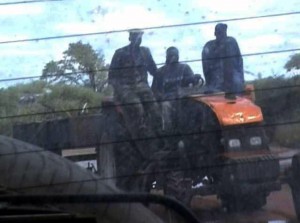Operation Taguta / Sisuthi: Command Agriculture in Zimbabwe; its impact on rural communities in Matabeleland
Command agriculture has to be contextualised against a background of the collapse of agriculture since 2000, and of epidemic corruption and inefficiency not only in this sector, but throughout the government policies in Zimbabwe.
Zimbabwe has faced a food deficit for several consecutive years, and the need to regain credibility for the land invasions, as well as fears of food riots, and the desire to be less dependent on international aid for reasons of national pride and sovereignty, all provide partial motives for Command Agriculture.
Zimbabwe is becoming increasingly militarised as a State, and the disastrous “Operation Murambatsvina” and “Operation Garikai” were both undertaken with the collaboration of the army. The army oversaw “Garikai” and soldiers were among the beneficiaries of the few houses built nationwide under the latter scheme, which has become part of the patronage system in Zimbabwe instead of providing housing for the displaced.
The army has been in control of food distribution for several years now, via control of Grain Marketing Board sales, the only source of affordable maize in rural areas.
Placing the army increasingly in control of food production via “Operation Taguta/Sisuthi” is the next logical step for government in the militarization of the State, and is a furtherance of the patronage of the army.
Giving the army effective control over large aspects of agriculture is keeping soldiers who might otherwise get bored and angry at their poor conditions, active and fed.
Command Agriculture has to be seen in the context of a now-established pattern of political abuse of maize, particularly in rural areas, through abuse of GMB sales. Maize has been consistently withheld from those perceived not to support the government over the last four years.
The pattern of behaviour shown by soldiers at irrigation schemes as summarised in the findings, is in keeping with this established pattern of manipulation of maize. Plot holders now have to beg for the very maize they themselves have laboured to grow, and soldiers have the power to say yes or no.
The destruction of productive market gardens can be viewed as part of the pattern of abuse of communities by government. The destruction of the economic base of these communities is either an act of unbelievable stupidity, or furtherance of a policy aimed at impoverishing rural communities as a means of controlling them.
The usurping of the early irrigation harvests could be an indication of the government intending to ensure that maize ends up in urban rather than rural areas: in urban areas there is a danger of riots if people are hungry, while in rural areas, hunger makes people compliant.
Deploying the army under the guise of Command Agriculture means that army units are now embedded deep in rural areas. This is effectively closing democratic space and will have a repressive impact during Rural District Council Elections due in September. It is likely that the army will stay in place and increase in numbers in rural areas, under the justification of Operation Taguta, from now until parliamentary and/or presidential elections.
Outcome of Command Agriculture
Command Agriculture has been a failure in the 2005/6 season in relation to improving maize production at rural irrigation schemes in Matabeleland. It has undermined such production, and has had an extremely negative effect on the community at large.
In terms of destroying self-sufficiency in rural populations and creating vulnerability through dependency on government as the only source of food, Command Agriculture is likely to prove a resounding “success”













